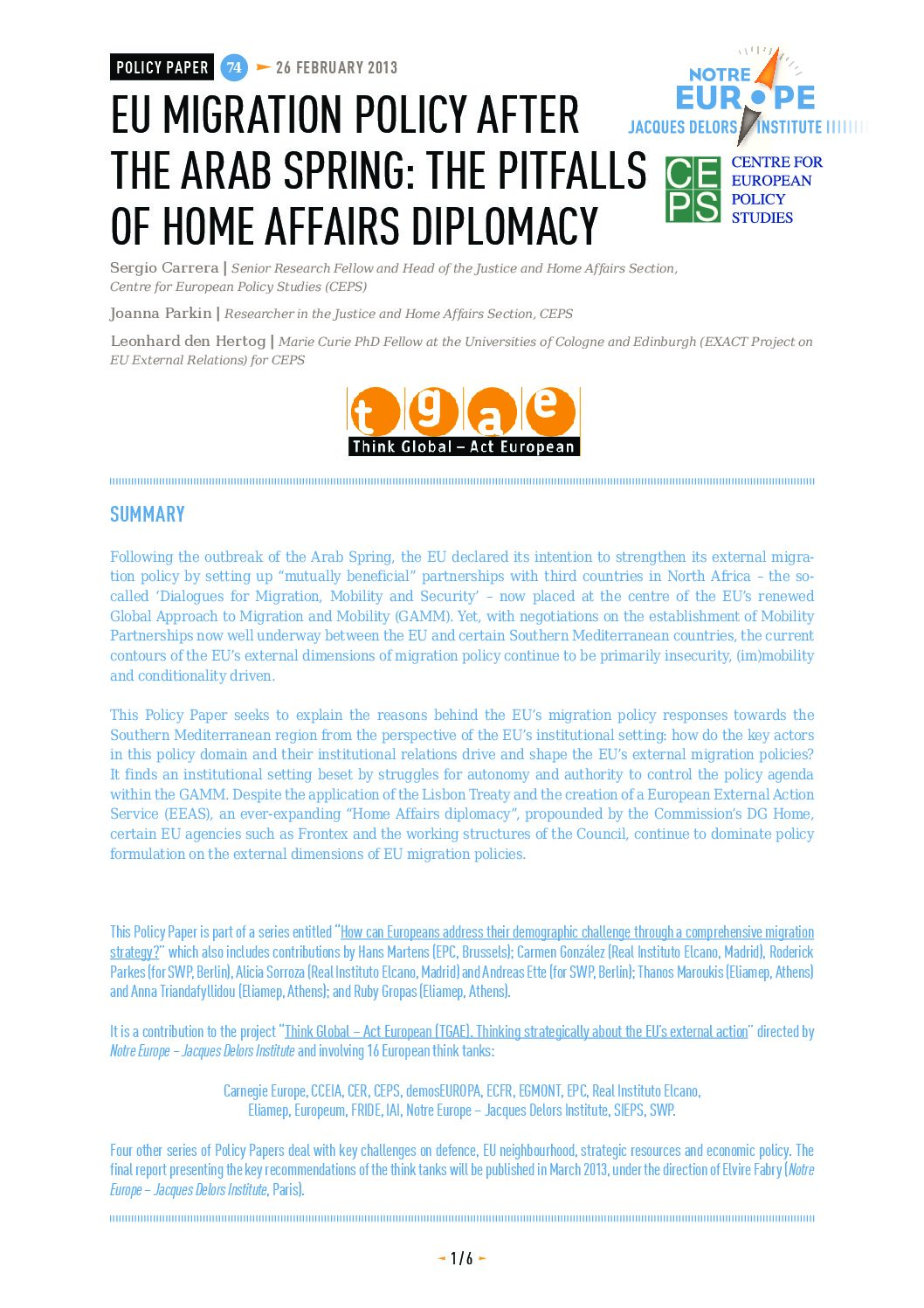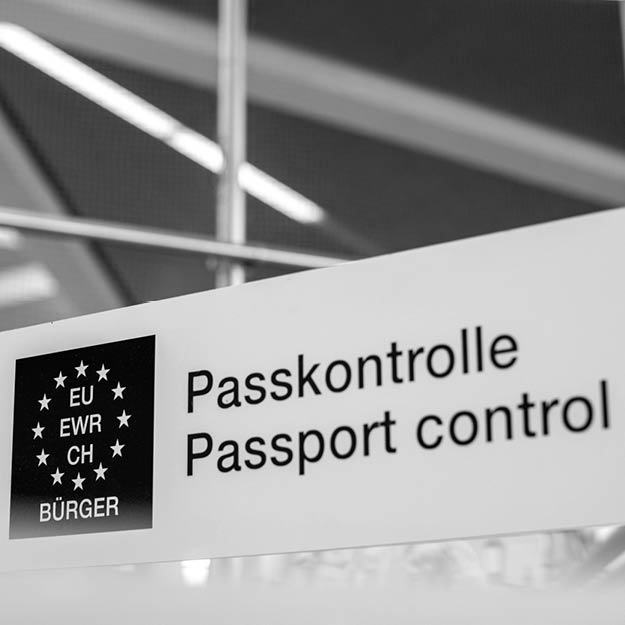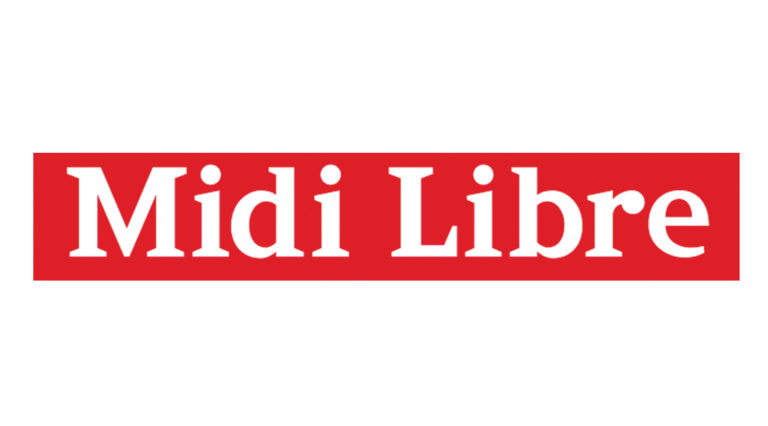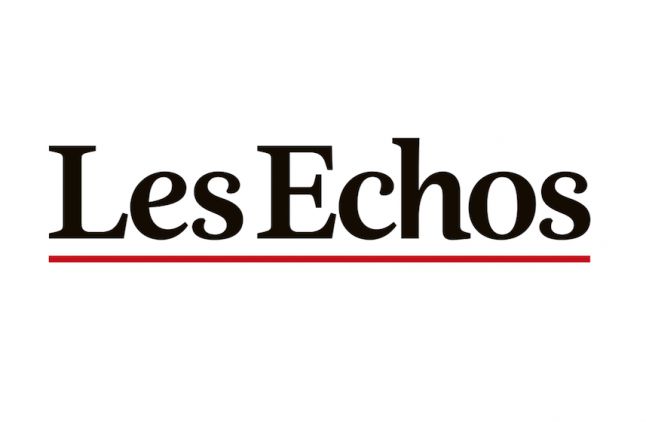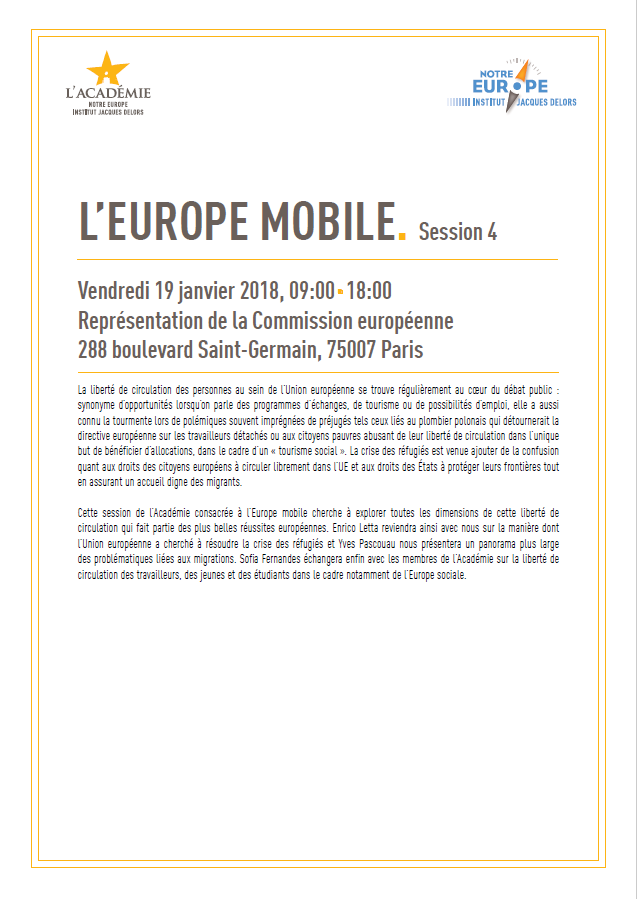Policy Paper 74
La politique migratoire de l’UE après le printemps arabe : les pièges de la diplomatie Affaires intérieures
Following the outbreak of the Arab Spring, the EU declared its intention to strengthen its external migration policy by setting up “mutually beneficial” partnerships with third countries in North Africa – the so-called ‘Dialogues for Migration, Mobility and Security’ – now placed at the centre of the EU’s renewed Global Approach to Migration and Mobility (GAMM). Yet, with negotiations on the establishment of Mobility Partnerships now well underway between the EU and certain Southern Mediterranean countries, the current contours of the EU’s external dimensions of migration policy continue to be primarily insecurity, (im)mobility and conditionality driven.
Disponible en anglais uniquement
Ce Policy Paper est une contribution de Sergio Carrera, Leonard Den Hertog and Joanna Parkin (CEPS) au projet Think Global – Act European (TGAE). Thinking Strategically about the EU’s external action dirigé par Notre Europe – Institut Jacques Delors (rapport disponible en mars 2013, dir. Elvire Fabry, Chercheur Senior, Notre Europe – Institut Jacques Delors).
Following the outbreak of the Arab Spring, the EU declared its intention to strengthen its external migration policy by setting up “mutually beneficial” partnerships with third countries in North Africa – the so-called ‘Dialogues for Migration, Mobility and Security’ – now placed at the centre of the EU’s renewed Global Approach to Migration and Mobility (GAMM). Yet, with negotiations on the establishment of Mobility Partnerships now well underway between the EU and certain Southern Mediterranean countries, the current contours of the EU’s external dimensions of migration policy continue to be primarily insecurity, (im)mobility and conditionality driven.
This article seeks to explain the reasons behind the EU’s migration policy responses towards the Southern Mediterranean region from the perspective of the EU’s institutional setting: how do the key actors in this policy domain and their institutional relations drive and shape the EU’s external migration policies? It finds an institutional setting beset by struggles for autonomy and authority to control the policy agenda within the GAMM. Despite the application of the Lisbon Treaty and the creation of a European External Action Service (EEAS), an ever-expanding “Home Affairs diplomacy”, propounded by the Commission’s DG Home, certain EU agencies such as Frontex and the working structures of the Council, continue to dominate policy formulation on the external dimensions of EU migration policies.
Ce Policy Paper fait partie de la série intitulée «La politique migratoire de l’UE : quelle stratégie pour relever le défi démographique ?» qui comprend les contributions de Hans Martens (EPC), Ruby Gropas (Eliamep), Andreas Ette (PISM), Roderick Parkes (SWP-PISM), Alicia Sorroza et Carmen Gonzales Enriquez (Elcano), Thanos Maroukis et Anna Triandafylliou (Eliamep).
Voir les autres contributions de la série migration >>
Ce projet est mené avec le soutien du 
SUR LE MÊME THÈME
ON THE SAME THEME
PUBLICATIONS
La migration par le petit bout de la lorgnette

La Moldavie face à la guerre

Suspendre les préférences commerciales au retour des migrants

MÉDIAS
MEDIAS
Le défi des migrations africaines en Europe

C’est du jamais vu depuis la crise migratoire : pourquoi les demandes d’asile sont au plus haut en Europe et dans quels pays ?

Union européenne : les demandes d’asile au plus haut depuis sept ans

ÉVÉNEMENTS
EVENTS
Académie Notre Europe | Session « Europe des migrations »

Académie Notre Europe : Session « Europe des migrations »

La réponse de l’UE aux réfugiés ukrainiens trois mois plus tard [EN]

Euroquestions | Réfugiés ukrainiens : accueil en Europe et impact sur la politique migratoire européenne ?

Sommet UE-Union Africaine : un partenariat renouvelé sur la migration et la mobilité ?

Migrations, asile, mobilité et intégration en Europe : indissociables va-leurs communes | Présentation du rapport paru en décembre 2021

Conférence | S’intégrer en Europe : Oxalá, Hopelijk, avec un peu de chance… | Regards croisés du Portugal, de France et de Belgique

Politique Européenne de la migration et de l’asile : un nouveau départ ? [EN]

EU migration and asylum policy: a fresh start?

Webinaire | Nouveau pacte pour la migration : la Commission peut-elle reprendre la main sur le dossier migratoire ?

Webinaire | Nouveau pacte pour la migration : la Commission peut-elle reprendre la main sur le dossier migratoire ?

Euroquestions | Migration et Asile : construire sur la proposition de la Commission

Euroquestions | Relance et puissance : mots d’ordre de la rentrée européenne

Des réponses européennes
à l’asile et aux migrations

Paris, 17 mai 2019 – Académie Notre Europe : Europe et migrations

Paris, 16 avril 2019 – Penser ensemble migration et développement

Paris, 12 février 2019 – Eurociné : projection du film DJAM

Bruxelles, 28 janvier 2019 – Présentation du rapport de l’Institut Jacques Delors sur les migrations

Pantin, 6 octobre 2018 – L’Union européenne peut-elle mieux gérer le flux migratoire ?










